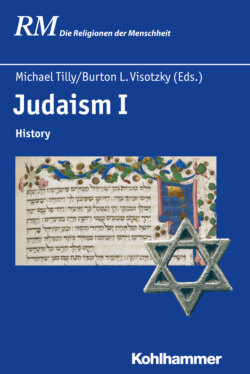Читать книгу Judaism I - Группа авторов - Страница 46
На сайте Литреса книга снята с продажи.
Greek literature and philosophy in Jewish Palestine
ОглавлениеAs works of Judean literature and historiography, Martin Hengel includes the works of the so-called Anonymous Samaritan (Pseudo-Eupolemus) and Eupolemus, as well as Jason of Cyrene.16 The Anonymous Samaritan, transmitted by Alexander Polyhistor as from Eupolemus and passed on by Eusebius Praep. ev. IX 17.2–9,17 clearly betrays a Samaritan author, as he moves Melchizedek (Gen 14) to Mount Gerizim (Praep. ev. IX 17.5–6). It is clear that he uses the LXX and is familiar with the punishment of Pharaoh for taking Sarah from Abraham, as mentioned in 1QGenApoc 20.17. Nonetheless, it is not appropriate to count him as one of the Greek-writing authors in Judea.18 Jason of Cyrene was »not a real Palestinian«19 and apparently gained his elevated Greek education in Alexandria. He wrote a five-volume work in the style of Greek pathetic historiography on the background and history of the Maccabean uprising under Judas (ca. 175–160 BCE), which the author of 2 Maccabees claims to have abridged as a single book.20 Whether the latter wrote in Judea or in the (Egyptian) diaspora is a matter of controversy.21 Finally, there is Eupolemus,22 a chronicler of history from Adam to his own day (Demetrius I, 162–150 BCE) and probably identical to the Eupolemus whom Judas Maccabee sent on a diplomatic mission to Rome in 160 BCE (1 Macc 8:17f.; 2 Macc 4:11). He used the LXX but also knew the Hebrew text.23 Moses was the »first sage« (Praep. ev. IX 26.1), who gave the Jews writing and the laws. The Phoenicians took writing from the Jews, and the Greeks from the Phoenicians. The account of Israel’s history is marked by »true inner commitment« and »occasional excesses. There is unmistakable pride in the way he describes the splendor of the temple construction under Solomon.«24 »So Eupolemus is the oldest Jewish25-Hellenistic historian in the narrower sense of the word (...) a first precursor of Josephus, like the latter a Palestinian and equally—but in a different historical situation—at pains to give a readable survey of his people’s history for a Greek-speaking readership.«26
